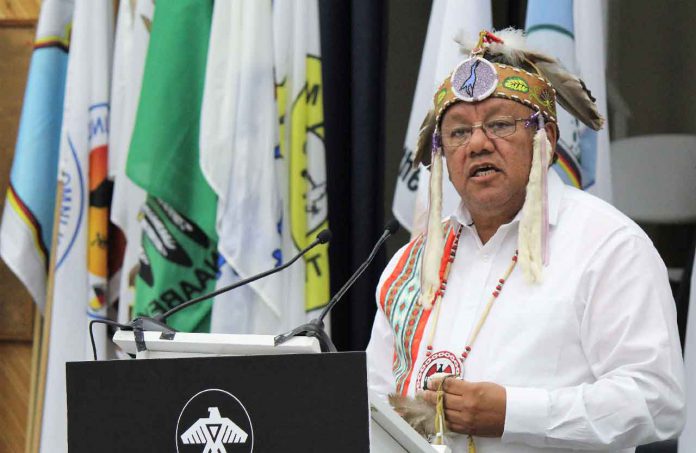TORONTO – Chiefs of Ontario, in collaboration with the Ontario Drug Policy Research Network, released two reports entitled “Opioid Use, Related Harms, and Access to Treatment among First Nations in Ontario” and “Impacts of the COVID-19 pandemic on opioid-related poisoning among First Nations in Ontario”. These reports highlight the increase in opioid-related poisoning during the COVID-19 pandemic and the urgent need to address the opioid crisis affecting First Nations in Ontario.
“The COVID-19 pandemic emerged amid an opioid crisis in our communities. The findings in these reports reinforce what First Nations leadership, families and communities have been demanding for decades,” said Ontario Regional Chief Glen Hare. “More needs to be done, and we must act now.”
Between 2013 and 2019, opioid use was higher amongst First Nations people, particularly for those living outside the community, compared to non-First Nations in Ontario. Since 2017, First Nations have seen an increase in opioid-related poisonings, primarily due to the growing presence of fentanyl in the unregulated drug supply. First Nations are largely over-represented in opioid-related deaths, with a mortality rate approximately four times higher than the rest of the population. Off-reserve First Nations individuals and those aged 44 years and younger are even more impacted.
“First Nations have been disproportionately affected by the overdose crisis. The use of opioids and other substances continues to surge during the COVID-19 pandemic, producing conditions that further increase overdoses and deaths,” said Regional Chief Hare.
The number of deaths attributed to opioid poisonings more than doubled during the pandemic. According to the Office of the Chief Coroner for Ontario’s Drug and Drug-Alcohol Related Database, 50 deaths directly related to opioid poisonings were recorded in the year prior to the pandemic (March 17, 2019 – March 16, 2020). In the first year of the pandemic, 116 First Nations lost their lives due to opioid poisoning (March 17, 2020 – March 16, 2021). This was an increase of 132 percent, compared to a 68 percent rise amongst the rest of the population. Of this increase, fentanyl-related poisoning contributed to 87 percent of opioid-related deaths. Other drugs were also involved in many of these deaths, with cocaine contributing to two out of every four fatalities and methamphetamines contributing to one-third of opioid-related deaths.
The COVID-19 pandemic restrictions led to border closures, restricted travel, and closure of many health centres and harm reduction sites. This resulted in a rise in the use of new and unfamiliar unregulated drugs and created barriers for First Nations to access harm reduction services, such as naloxone, in-person treatment, and wraparound services.
The Truth and Reconciliation Commission Calls to Action 18-24 direct governments to provide sustainable funding, effect change within the Canadian healthcare system, and address the distinct health needs of off-reserve First Nations people. It also calls upon the federal government to establish measurable goals, identify gaps in health outcomes, and recognize and implement the healthcare rights of First Nations.
Call for Justice 3.2 from the Final Report from the National Inquiry into Missing and Murdered Indigenous Women and Girls calls upon all governments to “provide adequate, stable, equitable, and ongoing funding for Indigenous-centred and community-based health and wellness services.” Call for Justice 3.4 seeks to ensure that “all Indigenous communities receive immediate and necessary resources, including funding and support, for the establishment of sustainable, permanent, no-barrier, preventative, accessible, holistic, wraparound services, including mobile trauma and addictions recovery teams.”
The opioid use epidemic has been disrupting families and whole communities across the region for years, amplified by the COVID-19 pandemic. The Chiefs of Ontario and Ontario Drug Policy Research Network reports demonstrate the underlying systemic racism and intergenerational trauma felt by First Nations and the urgent need for appropriate access to opioid treatment and harm reduction services that are essential for our communities to heal.
“The reports released today are very explicit in providing evidence that governments need to correct the underfunding that has been occurring for years to make effective progress on addressing the overdose crisis in First Nations communities,” continued Regional Chief Hare.
“Many communities have made great efforts to strengthen community capacity through community-led programs. However, the work to implement the recommendations in these reports must expand in earnest, through true collaboration between all sectors, to see real progress, prevent future tragedies, and strengthen the healing processes so desperately needed in First Nations communities.
I look forward to meeting with all levels of government immediately to coordinate a long-term, First Nations-led strategy to address the opioid crisis affecting First Nations across Ontario.”
Ontario Regional Chief Glen Hare
If you’re experiencing emotional distress and want to talk, please contact the toll-free Hope for Wellness Help Line at 1-855-242-3310 or the online chat at hopeforwellness.ca open 24 hours a day, 7 days a week.

